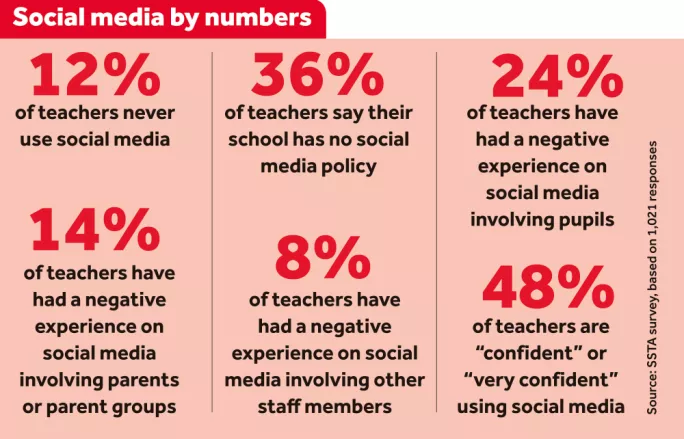Teachers bear the brunt of rise in social media abuse

Teachers are increasingly facing “vicious” and “abusive” treatment at the hands of parents on social media, a Tes Scotland investigation can reveal.
Unions and professional bodies are concerned about behaviour ranging from spreading gossip about teachers to threats of assault and mob justice against staff and pupils.
Exclusive survey findings of teachers lay bare a series of shocking incidents, some requiring police involvement (see “What staff say” box, below). But teachers do not always feel sufficiently supported by their school or local authority to challenge the culprits, the responses show.
A poll of more than 1,000 Scottish Secondary Teachers Association (SSTA) members, which contained questions provided by Tes Scotland, shows that one in seven has suffered negative experiences on social media involving parents, while more than a third were not aware of any social media policy in their school (see “Social media by numbers” box, below).
A separate online poll carried out by a teacher on Tes Scotland’s behalf, prompted by discussion on a popular primary teachers’ Facebook group, revealed that one teacher had been described on Facebook as a “nasty cow”, “bitch” and “the only teacher my daughter has ever hated”.
The survey respondent said: “When someone else said they had just seen this teacher in Asda, the original poster replied, ‘If I wasn’t in my pyjamas already, I’d be heading down there right now to get intae her’.”

‘Uninformed and abusive’
The AHDS school leaders’ body said abuse on social media was “an area of growing concern” because online platforms allowed “uninformed and abusive voices considerable reach”.
General secretary Greg Dempster cited one case in which parents used social media to share information about a pupil they said was bullying their child. “This was quickly picked up by others, with some offering to beat up the ‘bully’ and others referring to the school and headteacher in derogative terms,” he said.
The situation was dealt with robustly by local authority legal staff and police, but Mr Dempster said that such support was not guaranteed everywhere. “On one comparable occasion, a member was simply told to get a thicker skin,” he said.
While most, if not all, local authorities had policies on the use of social media by staff, Mr Dempster said: “You would have much less success finding policies about how to respond - or how a local authority will respond - to inappropriate, uninformed, vicious or abusive posts [aimed at staff].”
One teacher had been described on Facebook as a ‘bitch’ and ‘the only teacher my daughter has ever hated’
Mike Corbett, an executive member of the NASUWT Scotland teaching union, said that the online abuse of teachers by parents was “undoubtedly a growing problem”. Some 40 per cent of members canvassed in a recent survey by the union were aware of insulting comments made about them on social media, but 70 per cent of those failed to report the incident as they felt no action would be taken.
Eileen Prior, executive director of the Scottish Parent Teacher Council, said that social media was used by some to “bully and victimise”, but that online platforms could also be “enormously beneficial”.
Twitter, in particular, was effective in improving communication between parents and the education sector, she believed.
That view was shared by some of the teachers surveyed, with one saying: “I’ve only had one really negative experience with social media and a parent, and the benefits for me far outweigh the risks.” But less than half of secondary teachers are confident using social media, according to the SSTA poll.
Benefits of social media
Ben Marder, a social media expert at the University of Edinburgh Business School, said teachers should use pseudonyms and ensure that settings are on “private” so that they do not show up on Google.
They should not lose sight of the benefits of social media, such as the direct exchange of information between parents and teachers that Twitter can provide, he said.
However, he added that a school Twitter account must be “meticulously managed” and checked multiple times each day, with procedures put in place to deal with “social media fallouts”.
The General Teaching Council for Scotland advice on teachers’ use of social media recommends: “Use your discretion when dealing with friend requests from parents. It is acceptable to decline these invitations and remind parents of more formal channels for discussing their child’s education.”
The guidance will be updated later this year to reflect developments such as the increased use of Twitter and the emergence of Instagram and WhatsApp.
You need a Tes subscription to read this article
Subscribe now to read this article and get other subscriber-only content:
- Unlimited access to all Tes magazine content
- Exclusive subscriber-only stories
- Award-winning email newsletters
Already a subscriber? Log in
You need a subscription to read this article
Subscribe now to read this article and get other subscriber-only content, including:
- Unlimited access to all Tes magazine content
- Exclusive subscriber-only stories
- Award-winning email newsletters